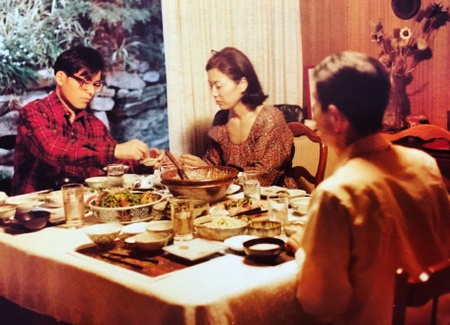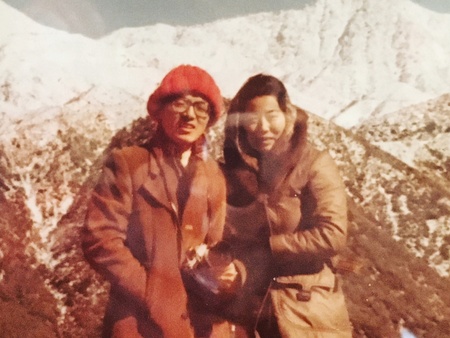And then you had another marriage. How did that happen?
Oh, with Ted. He was born and raised in Japan but my office Japan Airlines was in downtown L.A., on Sixth street. I needed brochures to put into the rack for the people to pick up to entice them on tours. So I went to Japan Travel Bureau one day, I said I’ll pick it up during my lunch hour. So I went to the office. And here was this man, you know, I’ve always talked to him by telephone. And he had the hardest accent, it’s always ‘Japan Tu-ra-vo-ru Bu-ro,’ something like that, and I used to always make fun of it to him. And finally meeting him one day, he’s quite–it just surprised me the stance of him. After I took the brochure, I guess he impressed me ever since then.
Wow. So he was from Japan?
Uh huh. And he was just here for assignment. They were saying people from Japan work here for a year, two years for the experience. And he was working at the Imperial Hotel where the tourists come. He was working there and I guess, I didn’t know him then. I’d stay always at the Imperial Hotel and I always went down to the tourist office to get material information so I can study Japan. But I never met him there, didn’t know he was working there. Isn’t it funny how probably your paths crossed earlier but you didn’t know?
And you liked him, and you already talked to him a lot so you just clicked?
No, it wasn’t until–oh yeah, after dropping in to pick up the material, I was impressed. But we were talking about skiing, that’s what it was. I said, ‘Our Japan Airline Group is going skiing on a certain weekend, did you want to join us?’ We’re just staying over the weekend. Maybe two days to ski. And I guess he was new to the city, too, just coming from Japan. But I had no idea he lived down close to where I was living, it’s on the other side of the hill. Same hill but on the other side. So he said yes, he’d like to join the Japan Airline Group. I was surprised, I barely made it down the hill with my skis. I couldn’t ski but I wanted to learn. But he was the one who was swishing down and I found out that as a little boy, he lived in the snow country on Japan’s seaside. So they would go skiing all the time.
I don’t know, [he studied] nature and Indians, the Native people of here, the country. And I said we knew some friends in New Mexico and we’ll be going to visit. And I asked him if we would like to go see some of the country in that area and he said he would love to. So we invited him to join us and that’s how we got to know each other a little better. But we were down in Canyon Mesa Verde I think it was, down this steep slope down below, and there’s this big cave-like place there’s a lot of homes built, where the earlier Indians live in. But you had to walk down this steep walkway down to the bottom. And I don’t know, just like Clarence, my husband then, he just walks on ahead and don’t care, or he’s way up here and I’m way back here, can’t make it quite up. You can climb these big stones, boulders to get up.
But Ted, we took him down there to see the place but he stayed behind to make sure that I made it up on the route up. And if it wasn’t for this one huge boulder, you couldn’t get up, you were looking around and you saw a hand coming down saying, ‘Come on. I’ll help you up.’ I was so touched that someone would cared enough to help you, pull you up. So that reaching hand, always, I never forgot it. And then of course we finished that trip all around to see the Indian homes and some of the exhibits. And Clarence, my first husband, he was getting more nastier and just ignoring and I don’t know. So I guess that’s where Ted became concerned about my well-being and welfare and he ends up taking care of me.
It’s funny how, I don’t know. Clarence used to always come and take money, your checks and everything, saying it was his property. So you were always left with nothing. I remember Mom and Pop, I said, ‘Clarence left again.’ They brought me a bag of rice but I decided it was time, I just cried in bed with Darice in her crib and I remember that’s when I went downtown, became self-sufficient somehow. But that changed my life since then when I finally made up my mind to take care of ourselves. I still remember Darice hanging onto my leg saying, ‘Mommy, Mommy, don’t go.’ She just cried. It was so sad. But I took the bus and went downtown, and they gave me the job right away.
And then when did you finally separate from Clarence? You were still married but you knew Ted.
Once I was at Japan Airlines, I just needed the brochures, I picked it up so since then, I talked to Ted afterwards. But it was always just casual, just friends. And they would always say, “Japan Tu-ra-vo-ru Bu-ro.” I used to tease. ‘What kind of trouble do you sell today?’ Crazy things. And how that kind of friendship could after a while grow but I had no idea he lived down on the other side of my same hill.
Adina: Yeah so getting a divorce was a big deal.
I could see at that time.
Oh yeah. It was shame.
But how many years were you married to Clarence?
Oh, umpteen years.
Adina: But she married Ted in, what ’79? It was around ’79. And then I was born ’80. So I don’t have any recollection of Ted at all but the two of them actually named me. So my Mom didn’t even get to name me [laughs].
So you and Ted gave Adina her name?
Yeah. In fact, he, he was the one that had to have the right name for her. And Kazumi, means way down in the depth of the ocean, far in the middle of the ocean somewhere, he said there was a very calm, quiet, serene environment. He said that’s what you want. [To Adina] So your Japanese character [kanji], it might be pronounced like many Kazu-something, it’s a very popular word. But her Japanese character is that deep ocean calm, beauty. It’s a special name and he named her.
How beautiful.
He liked mountains like I did, too and we went camping. Yeah, did a lot of things together. I was just so sorry he had to get sick like that, huh?
Adina: She doesn’t know, Grandma, you didn’t tell her that part yet.
Oh, he had stomach cancer, it seemed like he had it in Japan, it was very common. His sister, they were both living together somewhere a little north of Tokyo. Apparently the air was bad, factories around there, that’s where they lived. But she died with that stomach cancer and when I had broken my leg or something, and I was going to acupuncture, he was doing the needle thing on my ankles and my back because I messed up my back and my ankle got twisted and broken.
And he said one day, ‘You take Ted right away,’ you know, that weekend to a doctor. He said he has to get it taken care of right away. And I don’t know how he could know but he did know and we went to the family doctor and he referred us to another doctor and found out that it was already cancer. But unfortunately, we found out later it had already gotten into his stomach lining. He was healthy and strong so you would never known it.
So I was going to work everyday, I would stop by in the morning to see him. Going to work and then after work because my work demanded so much of me and I was senior. I had to clean up a lot of the messes. Days’ checks to ticket stocks, to just everything they didn’t want anyone just to handle it. So those are things I was doing at Japan Airlines after. So I had to stay late often. And after, I sometimes used to eat a lot over there at that corner, what was that dining–
Adina: Pacific Dining Car.
Yeah right across the hospital is a little eatery, dining room. So I used to go and have their vegetables. I used to like their vegetables. They give you a whole chunk of broccoli, it’s just a whole thing and that was all you could eat.
So they did take him into surgery and they took his stomach out so he could only eat spoonfuls of food. After a while, it’s taking its toll, you know? But in the meantime, when we could, we did travel. Went up to Canada or did things what we could do on trips because he loved the mountains, and I liked the mountains. Camping. I used to camp as a little girl. We used to go to Mammoth a lot, that direction. Learning all these new places.
Adina: So Ted passed away, it was ’81, something like that. So I grew up going with Grandma over to the cemetery to visit his gravesite and they always had these swans at the fountain area. So that’s one of my childhood memories was always going to visit his gravesite.
So you weren’t married very long at all then before they saw he had cancer. Wow, I’m sorry.
He was a special man, you know.
Adina: Yeah so Ted was the love of her life, that was short-lived.
Single love of my life, yeah.
A warm thank you to Adina Mori-Holt for coordinating this interview.
The audio from the interview:
*This article was originally published on Tessaku.com on May 13, 2018.
© 2018 Emiko Tsuchida








